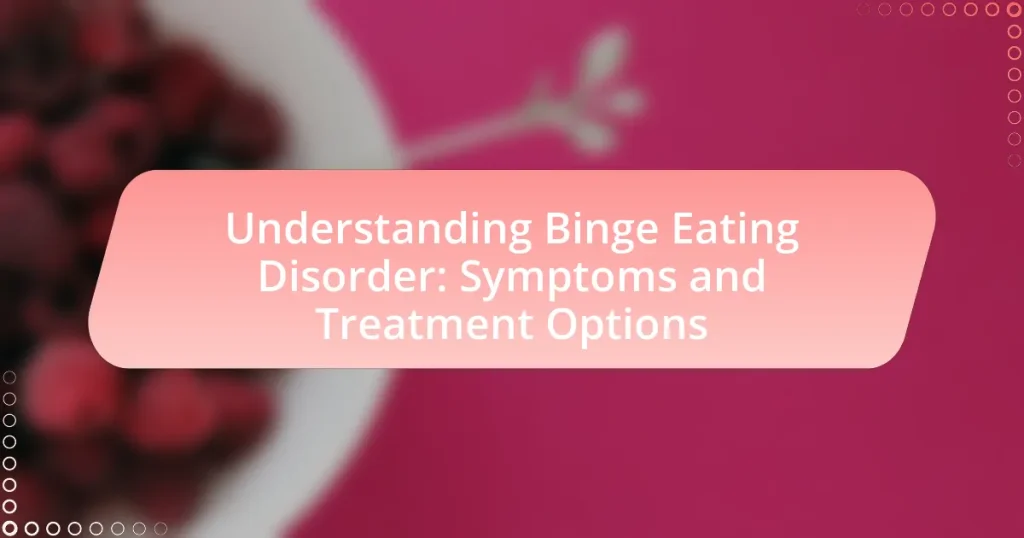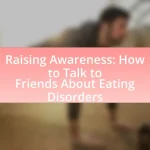Binge Eating Disorder (BED) is a prevalent psychological condition marked by recurrent episodes of consuming large amounts of food, often accompanied by feelings of loss of control and distress. This article provides a comprehensive overview of BED, including its diagnostic criteria, common symptoms, and the significant physical and emotional health risks associated with the disorder. It also explores effective treatment options, such as psychotherapy, medication, and lifestyle changes, while emphasizing the importance of understanding and addressing BED to improve the quality of life for those affected. Additionally, the article highlights practical strategies for managing the disorder and resources available for support and education.
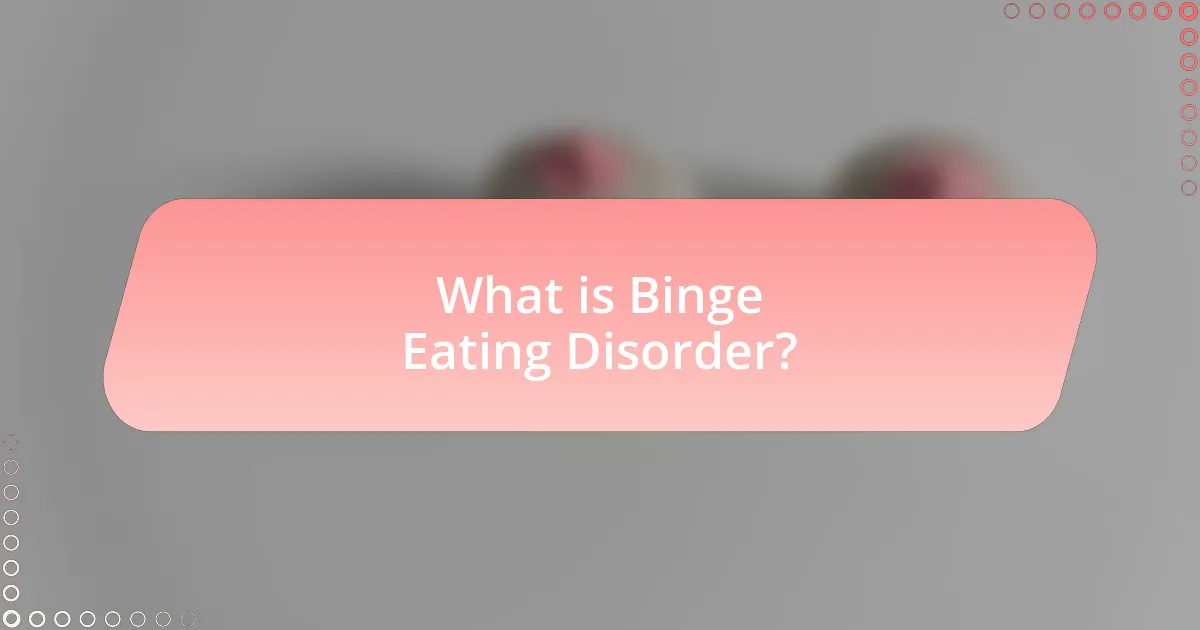
What is Binge Eating Disorder?
Binge Eating Disorder (BED) is a psychological condition characterized by recurrent episodes of eating large quantities of food, often quickly and to the point of discomfort. Individuals with BED frequently experience feelings of loss of control during these episodes and may also experience distress afterward, such as guilt or shame. According to the National Eating Disorders Association, BED is the most common eating disorder in the United States, affecting approximately 2.8 million adults. This disorder can lead to significant physical and emotional health issues, including obesity, diabetes, and depression.
How is Binge Eating Disorder defined?
Binge Eating Disorder (BED) is defined as a psychological condition characterized by recurrent episodes of eating large quantities of food, often to the point of discomfort, accompanied by feelings of loss of control during the episodes. According to the Diagnostic and Statistical Manual of Mental Disorders (DSM-5), individuals with BED experience significant distress regarding their binge eating, which occurs at least once a week for three months. This definition is supported by clinical research indicating that BED is the most common eating disorder in the United States, affecting approximately 2.8% of adults, highlighting its prevalence and the need for effective treatment options.
What are the diagnostic criteria for Binge Eating Disorder?
The diagnostic criteria for Binge Eating Disorder (BED) include recurrent episodes of binge eating characterized by consuming an unusually large amount of food in a discrete period, accompanied by a sense of lack of control during the episodes. According to the Diagnostic and Statistical Manual of Mental Disorders (DSM-5), these episodes must occur at least once a week for three months. Additionally, individuals with BED experience marked distress regarding binge eating, and the behavior is not associated with the regular use of inappropriate compensatory behaviors, such as purging, which distinguishes it from bulimia nervosa.
How does Binge Eating Disorder differ from other eating disorders?
Binge Eating Disorder (BED) differs from other eating disorders primarily in its characteristic behavior of recurrent episodes of eating large quantities of food, often to the point of discomfort, without subsequent compensatory behaviors like purging or excessive exercise. Unlike anorexia nervosa, which involves restrictive eating and an intense fear of gaining weight, or bulimia nervosa, which includes binge eating followed by purging, BED is marked by a lack of control over eating and feelings of distress related to the behavior. Research indicates that BED is the most common eating disorder in the United States, affecting approximately 3.5% of women and 2% of men, highlighting its prevalence compared to other eating disorders.
What are the common symptoms of Binge Eating Disorder?
The common symptoms of Binge Eating Disorder include recurrent episodes of eating large quantities of food in a short period, a feeling of loss of control during the binge, and experiencing distress regarding binge eating. Individuals may also exhibit eating rapidly, eating until uncomfortably full, and eating alone due to embarrassment about the quantity consumed. These symptoms are often accompanied by feelings of guilt, shame, or disgust after binge eating episodes. According to the Diagnostic and Statistical Manual of Mental Disorders (DSM-5), these criteria help in diagnosing the disorder accurately.
What physical symptoms are associated with Binge Eating Disorder?
Binge Eating Disorder is associated with several physical symptoms, including obesity, gastrointestinal issues, and metabolic syndrome. Individuals may experience rapid weight gain due to recurrent episodes of eating large quantities of food in a short period. This can lead to obesity, which is often characterized by a body mass index (BMI) of 30 or higher. Gastrointestinal problems such as stomach pain, bloating, and acid reflux are also common, resulting from the excessive food intake. Additionally, metabolic syndrome, which includes conditions like high blood pressure, elevated blood sugar, and abnormal cholesterol levels, can develop as a consequence of the disorder. These symptoms highlight the significant physical health risks associated with Binge Eating Disorder.
What emotional and psychological symptoms are present in individuals with Binge Eating Disorder?
Individuals with Binge Eating Disorder (BED) commonly experience emotional and psychological symptoms such as depression, anxiety, and low self-esteem. Research indicates that these individuals often use food as a coping mechanism to deal with negative emotions, leading to a cycle of binge eating followed by feelings of guilt and shame. A study published in the journal “Eating Behaviors” found that approximately 50% of individuals with BED also meet the criteria for major depressive disorder, highlighting the strong correlation between these conditions. Additionally, anxiety disorders are prevalent, with many individuals reporting heightened levels of stress and emotional distress related to their eating behaviors.
Why is it important to understand Binge Eating Disorder?
Understanding Binge Eating Disorder (BED) is crucial because it affects millions of individuals, with studies indicating that approximately 2-3% of the population experiences this condition. Recognizing BED allows for early intervention and effective treatment, which can significantly improve the quality of life for those affected. Furthermore, understanding the disorder helps to reduce stigma and promotes awareness, facilitating better support systems and resources for individuals struggling with eating behaviors. Research shows that untreated BED can lead to severe psychological and physical health issues, including obesity, depression, and anxiety, underscoring the importance of comprehension and action regarding this disorder.
What are the potential health risks associated with untreated Binge Eating Disorder?
Untreated Binge Eating Disorder (BED) can lead to significant health risks, including obesity, diabetes, cardiovascular disease, and gastrointestinal issues. Individuals with BED often engage in recurrent episodes of eating large quantities of food, which can result in excessive weight gain and obesity, a major risk factor for type 2 diabetes and heart disease. Research indicates that approximately 70% of individuals with BED are overweight or obese, increasing their likelihood of developing metabolic syndrome. Additionally, the disorder can cause psychological issues such as anxiety and depression, further complicating physical health. The National Eating Disorders Association highlights that untreated BED can also lead to chronic health conditions, including hypertension and high cholesterol levels, due to poor dietary habits and lack of physical activity.
How does Binge Eating Disorder impact daily life and relationships?
Binge Eating Disorder (BED) significantly disrupts daily life and relationships by causing emotional distress, social withdrawal, and health complications. Individuals with BED often experience feelings of shame and guilt after episodes of overeating, which can lead to isolation from friends and family. This disorder can also result in physical health issues such as obesity, diabetes, and cardiovascular problems, further complicating personal relationships and daily activities. Research indicates that individuals with BED are more likely to experience anxiety and depression, which can exacerbate relationship difficulties and hinder effective communication. The impact of BED extends beyond the individual, affecting family dynamics and social interactions, as loved ones may struggle to understand the disorder and its effects.
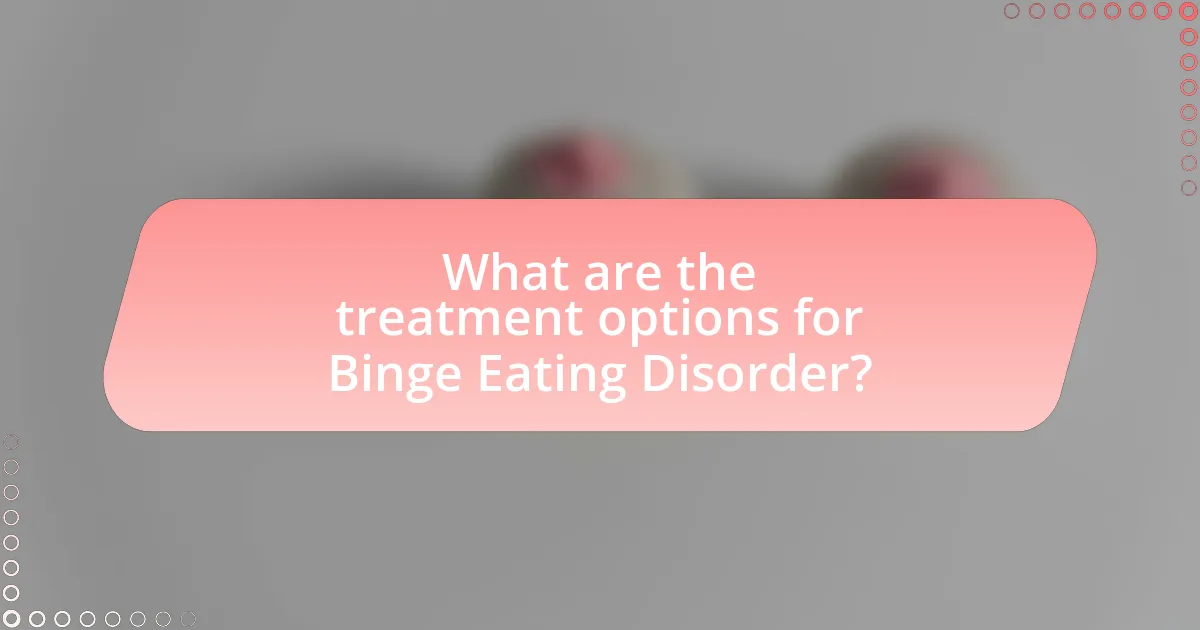
What are the treatment options for Binge Eating Disorder?
The treatment options for Binge Eating Disorder (BED) include psychotherapy, medication, and lifestyle changes. Psychotherapy, particularly Cognitive Behavioral Therapy (CBT), has been shown to be effective in reducing binge eating episodes and improving emotional regulation. Medications such as selective serotonin reuptake inhibitors (SSRIs) and the anticonvulsant topiramate have also been found to help manage symptoms of BED. Additionally, lifestyle changes, including nutritional counseling and exercise, can support recovery by promoting healthier eating habits and overall well-being. Studies indicate that a combination of these approaches often yields the best outcomes for individuals with BED.
How can therapy help in treating Binge Eating Disorder?
Therapy can significantly aid in treating Binge Eating Disorder (BED) by addressing the underlying psychological issues and developing healthier coping mechanisms. Cognitive Behavioral Therapy (CBT) is particularly effective, as it helps individuals identify and change negative thought patterns related to food and body image. Research indicates that CBT can lead to a reduction in binge eating episodes and improvements in emotional well-being. A study published in the Journal of Consulting and Clinical Psychology found that individuals receiving CBT showed a 50% reduction in binge eating episodes after treatment, demonstrating its efficacy in managing BED.
What types of therapy are effective for Binge Eating Disorder?
Cognitive Behavioral Therapy (CBT) and Dialectical Behavior Therapy (DBT) are effective therapies for Binge Eating Disorder (BED). CBT focuses on identifying and changing negative thought patterns and behaviors related to eating, which has been shown to reduce binge eating episodes significantly. Research indicates that CBT can lead to a 50% reduction in binge eating frequency for many individuals. DBT, which incorporates mindfulness and emotional regulation skills, has also demonstrated effectiveness in treating BED by helping individuals manage their emotions and reduce impulsive eating behaviors. Studies have shown that individuals undergoing DBT report improved emotional regulation and decreased binge eating episodes.
How does cognitive-behavioral therapy specifically address Binge Eating Disorder?
Cognitive-behavioral therapy (CBT) specifically addresses Binge Eating Disorder (BED) by helping individuals identify and change negative thought patterns and behaviors associated with binge eating. CBT focuses on the relationship between thoughts, feelings, and behaviors, enabling patients to recognize triggers for binge eating and develop healthier coping strategies. Research indicates that CBT is effective in reducing binge eating episodes and improving psychological well-being, with studies showing that approximately 50-70% of individuals with BED experience significant improvement after undergoing CBT. This therapeutic approach also emphasizes the importance of self-monitoring and goal setting, which further aids in managing eating behaviors and emotional responses.
What role do medications play in the treatment of Binge Eating Disorder?
Medications play a significant role in the treatment of Binge Eating Disorder (BED) by helping to reduce binge eating episodes and associated symptoms. Specifically, certain medications, such as selective serotonin reuptake inhibitors (SSRIs) like fluoxetine, have been shown to decrease the frequency of binge eating and improve mood. Research indicates that fluoxetine can lead to a reduction in binge eating episodes by approximately 50% in some patients, demonstrating its effectiveness. Additionally, the medication lisdexamfetamine has been approved for the treatment of BED and has shown efficacy in reducing binge eating behaviors. These medications, combined with psychotherapy, can enhance treatment outcomes for individuals with BED.
What types of medications are commonly prescribed for Binge Eating Disorder?
Medications commonly prescribed for Binge Eating Disorder include selective serotonin reuptake inhibitors (SSRIs), specifically fluoxetine, and the stimulant lisdexamfetamine. SSRIs like fluoxetine have been shown to reduce binge-eating episodes and improve mood, as evidenced by a study published in the Journal of Clinical Psychiatry, which found that fluoxetine significantly decreased binge eating in patients. Lisdexamfetamine, approved by the FDA for this condition, has also demonstrated efficacy in reducing binge eating frequency in clinical trials.
How do medications work to alleviate symptoms of Binge Eating Disorder?
Medications alleviate symptoms of Binge Eating Disorder (BED) primarily by targeting neurotransmitter systems that regulate mood and appetite. Specifically, certain medications, such as selective serotonin reuptake inhibitors (SSRIs) like fluoxetine, have been shown to reduce binge-eating episodes by enhancing serotonin levels, which can improve mood and decrease impulsivity. Research indicates that fluoxetine can lead to a significant reduction in binge-eating frequency and associated distress, as demonstrated in a study published in the American Journal of Psychiatry, where patients experienced a decrease in binge-eating episodes and improvements in overall psychological well-being. Additionally, medications like lisdexamfetamine and topiramate have also been effective in reducing binge-eating behaviors, further supporting the role of pharmacological interventions in managing BED symptoms.
What lifestyle changes can support recovery from Binge Eating Disorder?
Lifestyle changes that can support recovery from Binge Eating Disorder include establishing regular meal patterns, practicing mindful eating, engaging in physical activity, and seeking social support. Regular meal patterns help regulate hunger cues and reduce the likelihood of binge episodes. Mindful eating encourages awareness of food choices and emotional triggers, which can decrease impulsive eating behaviors. Engaging in physical activity not only improves physical health but also enhances mood and reduces stress, both of which are beneficial for recovery. Additionally, social support from friends, family, or support groups can provide encouragement and accountability, which are crucial for maintaining recovery. These lifestyle changes are supported by research indicating that structured eating habits and emotional awareness significantly contribute to the management of Binge Eating Disorder.
How can nutrition and meal planning aid in recovery?
Nutrition and meal planning can significantly aid in recovery from binge eating disorder by providing structured eating patterns and balanced nutrient intake. Structured meal planning helps individuals establish regular eating habits, which can reduce the likelihood of binge episodes by preventing extreme hunger and promoting satiety. Balanced nutrition, including adequate protein, healthy fats, and complex carbohydrates, supports stable blood sugar levels, which is crucial for mood regulation and reducing cravings. Research indicates that a well-planned diet can improve psychological well-being and decrease the frequency of binge eating episodes, as evidenced by studies showing that individuals who follow structured meal plans report lower levels of disordered eating behaviors.
What role does physical activity play in managing Binge Eating Disorder?
Physical activity plays a significant role in managing Binge Eating Disorder (BED) by helping to regulate mood, reduce stress, and improve overall physical health. Engaging in regular exercise can lead to the release of endorphins, which are known to enhance mood and decrease feelings of anxiety and depression often associated with BED. Research indicates that individuals who incorporate physical activity into their routine may experience a reduction in binge eating episodes, as exercise can serve as a healthy coping mechanism for emotional distress. A study published in the journal “Eating Behaviors” found that participants who engaged in regular physical activity reported fewer binge eating episodes and improved body image. Thus, physical activity not only aids in weight management but also contributes to psychological well-being, making it a valuable component in the treatment of Binge Eating Disorder.
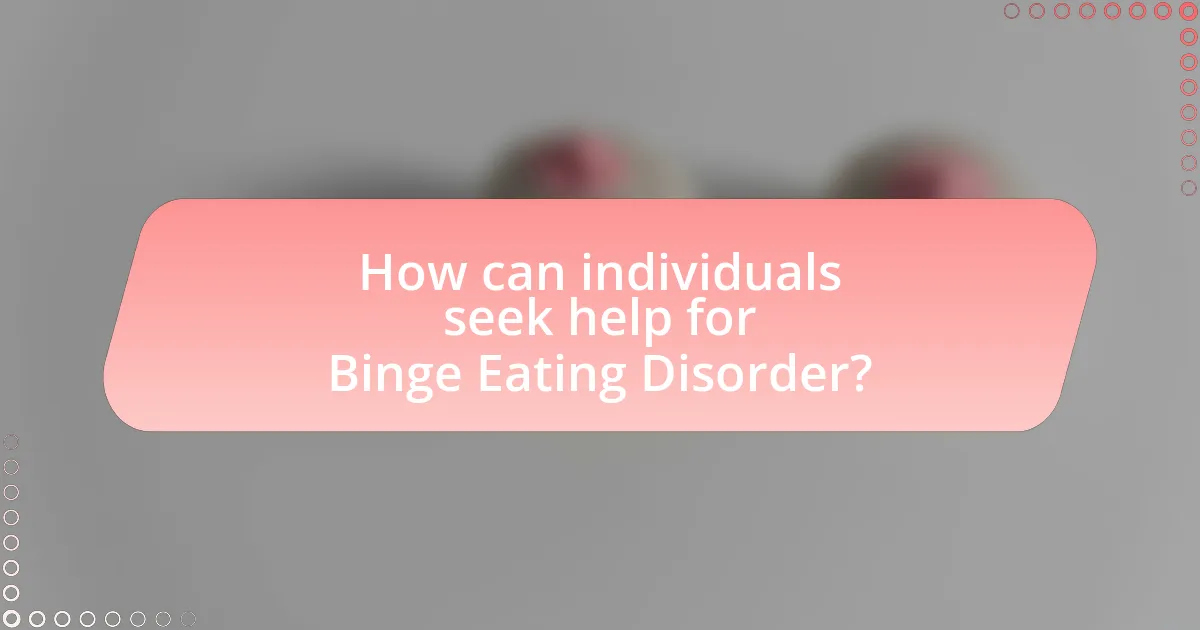
How can individuals seek help for Binge Eating Disorder?
Individuals can seek help for Binge Eating Disorder by consulting healthcare professionals such as psychologists, psychiatrists, or registered dietitians who specialize in eating disorders. These professionals can provide a comprehensive assessment and develop a tailored treatment plan that may include therapy, nutritional counseling, and, in some cases, medication. Research indicates that cognitive-behavioral therapy (CBT) is particularly effective, with studies showing that it can significantly reduce binge eating episodes and improve overall psychological well-being. Additionally, support groups and helplines can offer valuable resources and community support for individuals seeking help.
What steps should someone take if they suspect they have Binge Eating Disorder?
If someone suspects they have Binge Eating Disorder, they should first seek a professional evaluation from a healthcare provider, such as a psychologist or psychiatrist, who specializes in eating disorders. This step is crucial because a qualified professional can accurately diagnose the disorder based on established criteria, such as those outlined in the Diagnostic and Statistical Manual of Mental Disorders (DSM-5). Following the evaluation, the individual should consider engaging in a treatment plan that may include therapy options like Cognitive Behavioral Therapy (CBT), which has been shown to be effective in treating Binge Eating Disorder, as supported by research published in the journal “JAMA Psychiatry.” Additionally, joining a support group can provide community and shared experiences, which can be beneficial for recovery.
How can one find a qualified professional for treatment?
To find a qualified professional for treatment of binge eating disorder, one should start by consulting a healthcare provider for recommendations. Healthcare providers often have networks of specialists, including psychologists, psychiatrists, and dietitians who are experienced in treating eating disorders. Additionally, searching through reputable directories such as the Academy for Eating Disorders or the National Eating Disorders Association can help identify certified professionals. These organizations provide listings of practitioners who have met specific training and ethical standards in the field of eating disorders, ensuring that the professional is qualified to provide appropriate treatment.
What resources are available for support and education on Binge Eating Disorder?
Resources available for support and education on Binge Eating Disorder include the National Eating Disorders Association (NEDA), which provides a helpline, educational materials, and support groups. Additionally, the Binge Eating Disorder Association (BEDA) offers resources specifically tailored for individuals affected by binge eating, including treatment options and community support. Research indicates that access to these resources can significantly improve recovery outcomes, as evidenced by studies showing that individuals who engage with support networks report lower levels of distress and higher rates of treatment adherence.
What are some practical tips for managing Binge Eating Disorder?
Practical tips for managing Binge Eating Disorder include establishing a regular eating schedule, practicing mindful eating, and seeking professional support. Regular meal times help regulate hunger cues and reduce the likelihood of binge episodes. Mindful eating encourages individuals to focus on the sensory experience of eating, which can decrease the urge to binge. Professional support, such as therapy or counseling, has been shown to be effective; studies indicate that cognitive-behavioral therapy can significantly reduce binge eating episodes and improve emotional regulation.
How can mindfulness and self-compassion aid in recovery?
Mindfulness and self-compassion significantly aid in recovery from binge eating disorder by promoting awareness of thoughts and feelings while fostering a non-judgmental attitude towards oneself. Mindfulness helps individuals recognize triggers for binge eating, allowing them to respond to cravings with greater awareness rather than automatic behaviors. Research indicates that mindfulness practices can reduce emotional eating and improve self-regulation (Keng, Smoski, & Robins, 2011, Clinical Psychology Review). Self-compassion, on the other hand, encourages individuals to treat themselves with kindness during difficult moments, reducing feelings of shame and guilt associated with binge eating. Studies show that higher levels of self-compassion correlate with lower levels of disordered eating behaviors (Breines & Chen, 2012, Self and Identity). Together, these practices create a supportive framework for individuals to navigate their recovery journey more effectively.
What strategies can help prevent binge episodes in daily life?
To prevent binge episodes in daily life, individuals can implement structured meal planning and mindful eating practices. Structured meal planning helps ensure regular, balanced meals, which can reduce feelings of extreme hunger that often trigger binge eating. Mindful eating encourages individuals to focus on the sensory experience of eating, promoting awareness of hunger and satiety cues. Research indicates that these strategies can significantly decrease the frequency of binge episodes, as evidenced by a study published in the Journal of Consulting and Clinical Psychology, which found that participants who engaged in mindful eating reported fewer binge episodes compared to those who did not.
